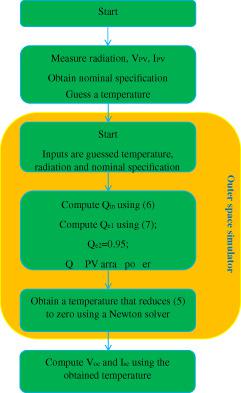当前位置:
X-MOL 学术
›
Int. Trans. Electr. Energy Syst.
›
论文详情
Our official English website, www.x-mol.net, welcomes your
feedback! (Note: you will need to create a separate account there.)
Design of an intelligent MPPT for a PV array mounted on a satellite considering outer space
International Transactions on Electrical Energy Systems ( IF 1.9 ) Pub Date : 2021-07-05 , DOI: 10.1002/2050-7038.12984 Sharareh Noroozi 1 , Heidarali Shayanfar 1 , Mehrzad Nasirian 1
International Transactions on Electrical Energy Systems ( IF 1.9 ) Pub Date : 2021-07-05 , DOI: 10.1002/2050-7038.12984 Sharareh Noroozi 1 , Heidarali Shayanfar 1 , Mehrzad Nasirian 1
Affiliation

|
In this study, a model reference adaptive state-dependent Riccati equation (MRASDRE) is proposed as a maximum power point tracking (MPPT) controller to extract the maximum power from a photovoltaic (PV) array mounted on an orbiting satellite. In the structure of the proposed MPPT, a fuzzy logic controller (FLC) is used to estimate the reference voltage of the PV array at the maximum power point (MPP), and an adaptive mechanism is used to compensate for the difference between the PV system and the reference model. The model reference generates the duty cycle for damping the oscillations of the DC-DC converter and tracking the MPP. A Lyapunov stability theory is used to obtain an adaption law to tune the gains of the adaptive mechanism. Hence, the stability of the closed system can be guaranteed, and the maximum power point (MPP) can be captured. To evaluate the performance of the proposed MPPT used in an orbiting satellite, the outer space environment is simulated. Also, an electrical power supply (EPS) is proposed to manage the generation and consumption of satellites. The efficiency of the proposed MPPT is verified in the simulation tests.
中文翻译:

考虑外太空的卫星光伏阵列智能MPPT设计
在这项研究中,模型参考自适应状态相关 Riccati 方程 (MRASDRE) 被提出作为最大功率点跟踪 (MPPT) 控制器,以从安装在轨道卫星上的光伏 (PV) 阵列中提取最大功率。在提出的 MPPT 结构中,模糊逻辑控制器 (FLC) 用于估计最大功率点 (MPP) 处光伏阵列的参考电压,并使用自适应机制补偿光伏系统之间的差异和参考模型。模型参考生成用于抑制 DC-DC 转换器振荡和跟踪 MPP 的占空比。使用李雅普诺夫稳定性理论来获得用于调整自适应机制增益的自适应律。因此,可以保证封闭系统的稳定性,并且可以捕获最大功率点(MPP)。为了评估在轨道卫星中使用的拟议 MPPT 的性能,模拟了外层空间环境。此外,还建议使用电源 (EPS) 来管理卫星的发电和消耗。在模拟测试中验证了所提出的 MPPT 的效率。
更新日期:2021-07-05
中文翻译:

考虑外太空的卫星光伏阵列智能MPPT设计
在这项研究中,模型参考自适应状态相关 Riccati 方程 (MRASDRE) 被提出作为最大功率点跟踪 (MPPT) 控制器,以从安装在轨道卫星上的光伏 (PV) 阵列中提取最大功率。在提出的 MPPT 结构中,模糊逻辑控制器 (FLC) 用于估计最大功率点 (MPP) 处光伏阵列的参考电压,并使用自适应机制补偿光伏系统之间的差异和参考模型。模型参考生成用于抑制 DC-DC 转换器振荡和跟踪 MPP 的占空比。使用李雅普诺夫稳定性理论来获得用于调整自适应机制增益的自适应律。因此,可以保证封闭系统的稳定性,并且可以捕获最大功率点(MPP)。为了评估在轨道卫星中使用的拟议 MPPT 的性能,模拟了外层空间环境。此外,还建议使用电源 (EPS) 来管理卫星的发电和消耗。在模拟测试中验证了所提出的 MPPT 的效率。











































 京公网安备 11010802027423号
京公网安备 11010802027423号